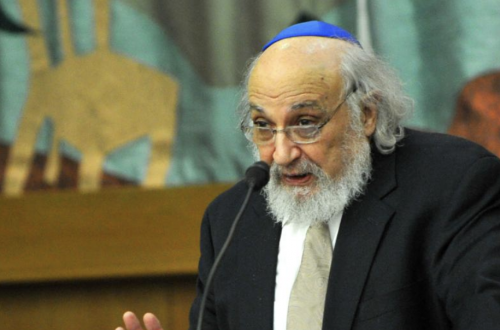Cross-posted from Ben Cohen at Pajamas Media
Here, in essence, is what Yale University told me on June 7, after I contacted its communications office to ask why an institute dedicated to the study of antisemitism had been shut down: some of our best friends are Jews.
“As you may be aware,” Yale spokesman Thomas Conroy wrote in an email, “Yale has long been a leader in Judaic research, teaching and collections. Yale’s Judaic Studies program has outstanding faculty members who conduct path-breaking research and inspire graduate and undergraduate students who choose from scores of courses and may earn degrees. The University library’s Judaica Collection is one of the strongest in the Western Hemisphere. The Fortunoff Video Archive for Holocaust Testimonies is a historic treasure and exceptional scholarly resource.”
All well and good. But why, I asked Conroy, was this information pertinent to the closure of the Yale Interdisciplinary Initiative for the Study of Antisemitism (YIISA), just five years after it opened its doors? “Yale has certainly made, and is making a contribution…through scholarly endeavors related to Jewish civilization, history and contemporary thought and issues,” he replied. “I point it out to add context.”
I have no doubt that Conroy made this statement with the best of intentions. However, his words reveal a fundamental misunderstanding of the very phenomenon which YIISA will no longer be able to probe. For any institution that invokes its munificence towards Jewish civilization, in answer to a question about its commitment to scholarly research on antisemitism, clearly doesn’t grasp what antisemitism is and what it represents.
One of the pitfalls of the contemporary antisemitism debate is that there is too much focus on intent. In the furore surrounding their sordid book, The Israel Lobby, John Mearsheimer and Stephen Walt frequently complained that they were being accused of antisemitism, when neither entertained hateful feelings towards Jews on a personal level. Now, if we accept the Mearsheimer-Walt definition of the antisemite as someone who consciously and brazenly loathes Jews, then there is indeed little point in studying contemporary antisemitism, since, in western countries at any rate, few people of any consequence would openly admit to hating Jews qua Jews.
On the basis of this definition, it follows that someone accused of antisemitism must be the target of a rhetorical trick designed to derail honest debate about, invariably, Israel and its supporters. It’s all very post-modern: the victims of antisemitism today are not Jews, but those tarred as antisemites. When mounting their defense, all such people have to do is point to the bevy of Jewish friends and colleagues in their rolodexes.
This silly distortion of antisemitism’s meaning is precisely why Yale’s 2006 decision to house YIISA, which began life as an independent research institution, was such a welcome milestone. One of the world’s finest universities was effectively saying that antisemitism, the hallmark of the two great totalitarian regimes of the twentieth century, cannot be reduced to a matter of personal opinion. In that regard, the fact that the Soviet Union coded its persecution of Jews with terms like “Zionists” and “rootless cosmopolitans” provides a historical foundation to examine the linguistic slipperiness of antisemitism in our own time.
If scholarly enquiry into antisemitism is, then, a legitimate pursuit, what was the problem with YIISA? According to Yale, YIISA was an academic dud. Professor Donald Green, the director of Yale’s Institute for Social and Policy Studies (ISPS), said that YIISA’s papers failed to excite the interest of “top-tier journals in behavioral science, comparative politics, or history.” Students were not attracted to its programs. Contrast that, Green went on, with another ISPS program “that straddles social science and humanities, Agrarian Studies, [and] has produced dozens of path-breaking scholarly books and essays.”
This is an unfair comparison. Few scholars will bat an eyelid at the mention of Agrarian Studies, whereas the idea of studying contemporary antisemitism — the “historical” kind is a little more acceptable — will meet with howls of disapproval in countless political science departments. Just by existing, YIISA was going against the grain. In that kind of environment, getting your papers published was never going to be easy.
YIISA, in point of fact, did produce some important scholarly work during its short life-span, including three outstanding papers by David Hirsh (on anti-Zionism and antisemitism), Bassam Tibi (on the Islamization of antisemitism), and Yaakov Kirschen, a.k.a the cartoonist “Dry Bones” (on antisemitism and ‘coded images’). Its regular seminars featured some of the leading thinkers on the subject, like Moishe Postone and Gregory Stanton. Those in the YIISA community with whom I spoke emphasized that they wanted to do even more, citing lack of resources as the main reason why they didn’t.
Even so, let’s concede for a moment that YIISA’s work, in the words of Professor Green, “failed to meet high standards for research and instruction.” Surely YIISA was a candidate ripe for intervention, not closure? By closing YIISA, isn’t Yale telling those who argue that contemporary antisemitism is the equivalent of a reputational smear campaign that they are right?
This is where the politics comes in. In my correspondence with Thomas Conroy, I pointed out that YIISA’s 2010 conference, which extensively examined antisemitic manifestations in Iran and in the wider Arab/Muslim world, had provoked angry responses from, among others, Maen Areikat, the PLO’s Washington representative, who ranted about “anti-Arab extremism and hate-mongering.” “Yale doesn’t make decisions about programs (or individual scholars) based on outside criticism,” Conroy told me.
Even if Conroy is correct here, Yale’s decisions resonate far beyond its ivory towers. It beggars belief that Yale’s academics did not pause to consider that closing YIISA would be interpreted by Areikat — a man who recycles the idiocy that Arabs cannot be antisemites because they are “Semites” — as a vindication of his attack. Moreover, Areikat was not alone. Among those joining the anti-YIISA clamor were Philip Weiss, the pea-brained anti-Zionist blogger sponsored by The Nation magazine, and his sidekick Ben White, a frankly creepy figure who couches his antisemitism in the language of Christian liberation theology. After the YIISA conference, this duo — of all people!! — whined about the “besmirching of Yale University by the presence of this festival of propaganda.”
Of course, were Yale to organize an academic conference on the subject of “Israeli apartheid,” Weiss, White et al. would be salivating at the prospect. For critics like these, academic integrity is only relevant when it boosts their argument.
Any dispassionate survey of the social sciences reveals that there is precious little “value-free” research going on anywhere. I only have to look at my own alma mater, the London School of Economics, which, inter alia, has accepted funding from the murderous Gadhafi regime, and gave the clownish Naomi Klein a fellowship. Or I could venture into upper Manhattan, where Joseph Massad’s Columbia University classes on Middle East politics are their own “festival of propaganda.” The point is, why pick on YIISA alone?
One of the most influential critiques of current social science in recent years, “The Flight from Reality in the Human Sciences,” was written by Ian Shapiro, himself a professor at Yale. In it, Shapiro draws on work conducted with his colleague, Donald Green, to advocate for “problem-driven” scholarship (writes Shapiro: “…the problem-driven scholar asks, ‘Why are constitutions enacted?’ or ‘Why do they survive?’ and ‘Why do ideologies develop?’ or ‘Why do people adhere to them?’”) I would venture that antisemitism is an ideal subject for such a method (“What is antisemitism now? How is it different? Why does it persist?”)
Let us hope that YIISA finds a new home to continue this research. Admiration for Jewish achievements is not a necessary condition for an offer; a genuine commitment to the subject absolutely is.
Ben Cohen is a writer and media consultant based in New York City. He writes a column for The Huffington Post and regularly contributes opinion pieces and blogs at The Jerusalem Post, Harry’s Place, Tablet, Congress Blog and many other online and print publications. His scholarly work includes the monograph “The Ideological Foundations of the Boycott Campaign Against Israel,” published by the American Jewish Committee, as well as analytical papers for the Jerusalem Center for Public Affairs and the Institute for Jewish Policy Research. He has also appeared as a commentator for a range of broadcasters.

